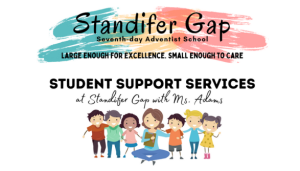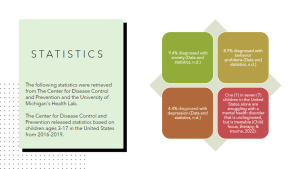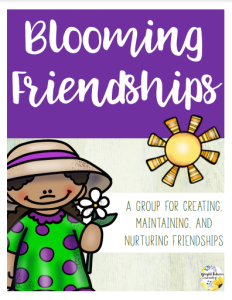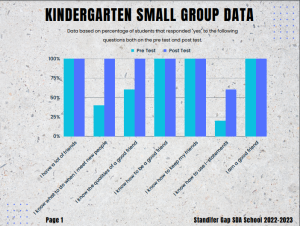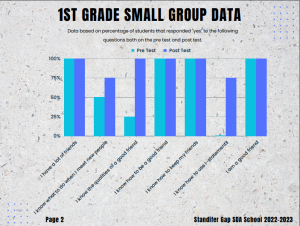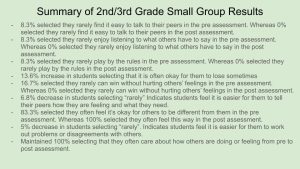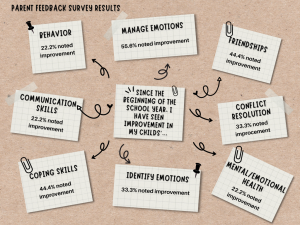Introduction
As a part of my practicum experience at Collegedale Academy Elementary and Middle School with the Counseling Department, I got the opportunity to pilot a program at a similar, but smaller, nearby Seventh-day Adventist School. This project was titled “Student Support Services” and took place from September 2022 – May 2023 at Standifer Gap Seventh-day Adventist School. This project was made possible because of the combined efforts of myself, my supervisor, Amanda Ancheta, my professor, Stephanie Guster, and permission from the Georgia Cumberland Conference. Additional participants in getting this project going were the current principal at Standifer Gap SDA School, Kent Kast, former principal, Joel McQuistan, and members of different committees such as Heather Runyon and Leah Parris. Lastly, students and parents of students attending the Standifer Gap SDA School, faculty, and teachers at Standifer Gap SDA School were final participants in this project.
Social Issue
Standifer Gap SDA School is a small, private, Seventh-day Adventist school in the Chattanooga area. This school, along with about 4 other small Seventh-day Adventist schools in the area, serves many children and families that prefer to have a smaller school that is religiously based. However, because of the small size, and being religious based, they do not have the resources available to them that public schools have. One resource that they often do not have is access to a mental health professional such as a school counselor or school social worker. These children have mental health needs that are no different from children at a public school, yet their needs often go unaddressed because of this social issue. According to the Center for Disease Control and Prevention, data gathered from 2016 through 2019 showed that 9.4% of children ages 3-17 in the United States were diagnosed with anxiety, 8.9% were diagnosed with behavior problems, and 4.4% were diagnosed with depression (Data and statistics, n.d.). While these statistics show relatively low numbers, this only represents a portion of the population. The population that is represented is the children who have an official diagnosis. According to a study done by the University of Michigan’s Health Lab, it was found that one (1) in seven (7) children in the United States alone are struggling with a mental health disorder that is undiagnosed, but is treatable (Child focus, therapy, & trauma, 2022). Part of the issue is that there has been a stigma that mental health needs do not exist in the Adventist world. This stigma has been passed down for generations and much work has been done to combat this stigma. The other part of this issue is that because the schools are small, they do not have the funding to hire a mental health professional to be in their school.
This issue is significantly impacting the students at Standifer Gap SDA school, but also on a broader spectrum of the smaller schools in the Georgia Cumberland Conference as well as smaller schools across the states. Since it is not a requirement to have a mental health professional at the schools in the Georgia Cumberland Conference and other Adventist conferences as well, countless mental health needs go unaddressed. The people affected by this are the students at Standifer Gap SDA School and other Adventist schools, the teachers at Standifer Gap SDA School and other Adventist Schools, as well as the parents of students at Standifer Gap SDA School and other Adventist Schools.
Theoretical Application
While going through the process of implementing this pilot program at Standifer Gap SDA School, one theory that played a role and correlated with this social issue is the Systems theory. This theory discusses how things relate to each other within a greater, more complex system. Within the Adventist school system, students relate to each other in the school, but the schools are also part of a conference, ultimately going all the way up to the North American Division of Seventh-day Adventist level. Taking the principals of the systems theory, there are multiple aspects that go into making a successful school for students where all aspects of their well-being are addressed. Things such as Math, Science, Language Arts, as well as Technology and Recess are all important aspects that make up the system at the school. However, there is one aspect that is missing to truly create a complete, holistic school system. This missing link is mental health services in the smaller Seventh-day Adventist schools. By implementing Student Support Services at Standifer Gap, we are working to close this gap and provide a complete, more holistic school environment for students, faculty and families.
This project was initiated by Stephanie Guster, Amanda Ancheta, Heather Runyon, Leah Parris of the home and school board at Standifer Gap SDA School, and myself. The project is sponsored by the Standifer Gap SDA School. Georgia Cumberland Conference is in support of this project as well.
Research
Research shows that children struggle with mental health and that interventions that are specifically designed for the school system are beneficial in decreasing mental health concerns among children, teaching children coping skills, and providing preventative intervention. A study done to determine if School Based Mental Health Counseling Intervention would be effective for students in elementary school found that children did in fact benefit after just 5 sessions. The students showed improvement in active listening and empathetic responses, confidence and competence (Kelchner, Perleoni, & Lambie, 2019). Another study done to determine what effect School based mental health counseling interventions would have on the overall attendance, behavior, and emotional problems of an elementary school found similar results. It was found that having an in school mental health counseling intervention increased attendance and decreased emotional issues among students (Lambie, Solomon, Joe, Kelchner, & Perleoni, 2019). Lastly, a study looking at the changes in mental health symptoms before and after school based mental health intervention found that there was a decrease in anxiety, depression, and general distress after participating in a school based mental health intervention program. Additionally, there was an increase in self-esteem and self-efficacy amount students who participated in the intervention program (Shoshani & Steinmetz, 2014). These research studies as well as others help to show the importance of school based mental health services and interventions for children and how beneficial they can be. While there has not been much research done on having these interventions in Adventist schools specifically, I am confident that the results would be similar as children in Adventist schools are exposed to and deal with many of the same situations in life as any other child.
Interventions
The mission of this project is to provide the necessary mental health services to students, teachers, and parents at Standifer Gap SDA School with a long-term intent to build a plan to provide mental health services to the other 4 small Adventist schools in this area as well. Some goals of this project include providing mental health services to Standifer Gap SDA School for this current school year, advocate at the local and conference level for the need of mental health professionals in all Adventist schools, and successfully getting mental health professionals into the Adventist schools in the Chattanooga and surrounding areas.
At the start of the program, a pamphlet was sent out to parents/guardians of students attending Standifer Gap SDA School informing them of the added program as well as what this program would offer. To view this pamphlet, click the following link: Introduction Pamphlet for Standifer Gap SDA School. Additionally, a letter was also sent out along with the pamphlet to help introduce the project. This letter can be viewed through the following link: Standifer Gap Parent Letter Introducing Project.

Intervention tools include the Creating a Culture of Kindness curriculum for middle school whole class lessons, the 5th grade Second Step curriculum for whole class lessons for 4th and 5th grade, A Sea of Friends for 2nd-3rd small group, Blooming Friendships curriculum for K-1st small group, and CBT, problem solving skills, DBT, and coping skills for individual meetings with students. Whole class lessons with 4th – 8th grade occur weekly, small groups for kindergarten – 3rd grade occur weekly
of Kindness curriculum for middle school whole class lessons, the 5th grade Second Step curriculum for whole class lessons for 4th and 5th grade, A Sea of Friends for 2nd-3rd small group, Blooming Friendships curriculum for K-1st small group, and CBT, problem solving skills, DBT, and coping skills for individual meetings with students. Whole class lessons with 4th – 8th grade occur weekly, small groups for kindergarten – 3rd grade occur weekly through 2nd and 3rd quarter, and individual check ins occur weekly based on self-referrals, parent referrals, or faculty referrals.
through 2nd and 3rd quarter, and individual check ins occur weekly based on self-referrals, parent referrals, or faculty referrals.
As a way to track students’ feelings, 4th-8th grade students filled out a check-in form every few weeks on which they shared things that were going well, things that were going not so well, as well as which feelings they have been experiencing. At the bottom of the form, students can request a follow-up from myself, the classroom teachers, or the church pastors. To view this form, click here. A Spanish copy can be viewed by the following link as it aided in engaging across multi-cultural systems: Student Check-in Form (Spanish Version). Students can also receive a check-in from a teacher referral, parent referral, or social worker initiated. The link to the parent and teacher referral form are available on my email signature as pictured below:
Bree Adams, BSW
School Social Work Master’s Intern/Student Support Services
- Standifer Gap Parent Referral Form: https://forms.gle/kEuqWFv48tj7ktbu8
- Standifer Gap Teacher/Staff Referral Form: https://forms.gle/Hwb2FfABMPX57WFA9
The program SCUTA was utilized for all documentation as it provides confidential, password protected ways to store information. This program is utilized by many school counselors and school social workers across many districts.
A parent feedback survey was sent out in February 2023 to engage with the parents and collect their feedback for the project thus far. The email that was sent to parents/guardians can be viewed by clicking the following link: Student Support Services Feedback Survey (Test Email). This survey allowed me to see what was going well and what could be changed to impact the students and families more. The results of this survey were beneficial in structuring the remaining time of the program. 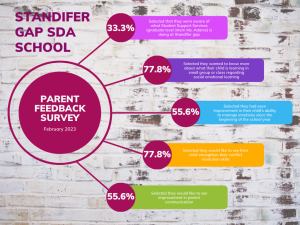
The results showed that parents wanted to learn more about what I was doing in the school, and what their kids were learning in the class lessons or small groups. The day after this survey was sent out, changes were made and a page on the school’s website was created specifically for the Student Support Services program. This website can be viewed here: Support Services : Standifer Gap SDA School Chattanooga TN (adventistschoolconnect.org). Additionally, a spot in the weekly “Gap Rap” newsletter was created specifically for Student Support Services. In this section, information about topics discussed in classroom lessons is shared as well as pictures or illustrations utilized. To view the Student Support Services section in the 4/26/23 “Gap Rap”, click the following link: Gap Rap 4.26.23
Results
**Disclaimer: The results from this project are still being collected as the project is still ongoing. More information will be added as available. **
Over the course of the school year, this project has seen improvement and results from multiple aspects. A total of 42 whole classroom lessons were taught for students in the 4th through 8th grade classrooms covering topics such as emotions and ways of dealing with different emotions, including others, conflict management, dealing with anger, learning other people’s perspective, avoiding judgement, kindness, as well as others. Additionally, 28 small group sessions were held with students from kindergarten through 3rd grade. These small groups were focused on friendship and discussed topics such as what a good friend does, how to be a good friend, how to make new friends, dealing with conflict, appreciating others, and more. The number of individual check ins will continue to change due to services still being in place. However, as of 4/24/23, approximately 91 individual check ins with students have been completed.
To help track progress throughout the whole classroom lessons, 6th-8th grade students took the CASEL questionnaire at the start of the project implementation. The CASEL (Collaborative for Academic, Social, and Emotional Learning) questionnaire looks at 5 different aspects of a student’s life including: Self-Awareness, Self-Management, Social Awareness, Relationship Skills, and Responsible Decision-Making. More information about CASEL can be found at https://casel.org/. These results served as a baseline for students’ progress over the course of the project. The same questionnaire was completed by the same students in the middle of the project to track progress thus far and see what areas needed to be focused on for the reminder of the project. Lastly, the same questionnaire was taken towards the end of the project implementation to track final progress that had occurred over the course of the school year. At this time only the pre assessment and mid assessment have been taken by students. To view the results of this, click here. Highlights pulled from the overall results can be viewed through the following link: Standifer Gap CASEL Assessment Pre to Mid Assessment Highlights
Within the small group for kindergarten through 3rd grade, two different curriculums were utilized. For Kindergarten and 1st grade, I used the Blooming Friendships curriculum. At the start of this curriculum, I had the students take a pretest asking different questions about friendships. At the end of our sessions together, I had students fill out the same questionnaire to see what progress the had made. The following graphs depict the students’ responses on the pretest and posttest. All questions were yes or no questions; therefore, the graph depicts the percentage of students who responded yes to each question.
For the 2nd-3rd grade small group, I utilized A Sea of Friends curriculum. This curriculum also had a pretest and posttest for students to take to track progress throughout the course of the small group. Students again took a questionnaire the first time we met to provide a baseline. After going through the curriculum, the students took the same questionnaire again to track progress that had been made. The full results of this questionnaire can be viewed here. A summary of the results can be found through the graphic below:
Parent feedback survey results:
Going forward, advocacy efforts are still in progress to continue the project at Standifer Gap SDA School as well as expanding to additional schools including Lester Coon Adventist School (LCA), Ooltewah Adventist Kindergarten and School (OAKS), Bowman Hills SDA School, and Learning Tree SDA School. However, this is being proposed as becoming a position supported by the Georgia Cumberland Conference. A full proposal is being written and will be submitted to the conference as well as sent to the schools involved. This proposal is not yet available but will be uploaded once completed. To assist in putting together this proposal, the other smaller Seventh-day Adventist schools in the area were invited to participate in the advocacy work by having their middle school students take the same CASEL questionnaire. This allows us to analyze the data and develop a needs assessment for the other schools beyond just Standifer Gap SDA School. The email sent out to the smaller schools can be viewed by the following link: Student Advocacy Questionnaire Email (Sent to Smaller SDA Schools). Additionally, a parent consent letter was sent to the schools to have parents/guardians review prior to students taking the questionnaire. This letter can be viewed through the following link: CASEL Questionnaire Parent Consent Letter. This process is still ongoing so results are not available at this time. They will be uploaded upon completion. It is expected that the results will be similar to that of the students at Standifer Gap SDA School prior to interventions being put in place. Lastly, the principal’s at the different smaller schools have recognized this as a need in their schools and have taken action towards expanding the program to their schools. The principals are discussing together and planning to meet up to discuss things further. A date for this meeting has not been set yet.
The unaddressed mental health needs in smaller Seventh-day Adventist schools does not only exist in the Georgia Cumberland Conference, but change is possible, and it starts with the Georgia Cumberland Conference.
Conclusions
What the school has to say:
“We looked forward to every Friday afternoon when we could go with you. We learned how to be kind to other people, to recognize our feelings, to be responsible, not to be bossy, to share with others, to be thankful, and to be nice. We liked doing the “I” statements. We also liked learning to take time to do things, follow directions, and to follow the rules.”
– Kindergarten and 1st Grade students
_________________________________________________________________________
“Thank you for teaching us to respect other people.”
“Thank you for teaching us about our feelings. Thank you for helping every Friday. You are a great friend.”
“Thank you for teaching us to be respectful, kind, and helpful. Thank you for being nice to us and kind to us.”
“We miss you. Thank you for teaching us to listen to others and be kind. We appreciate you.”
– 2nd/3rd Grade Students
_________________________________________________________________________
Be Unique Be You Pamphlet (4th-5th Grade)
– 4th/5th Grade Students
_________________________________________________________________________
“Thank you for helping our school be a better environment by you teaching us how to keep calm and cool.”
“Thank you for coming to this school. I have really enjoyed when you come to talk to us. You made me realize more things about me and how I should act.”
“Thank you for coming to our school and helping us with our emotions.”
“Thank you for the counseling. It helped everyone a lot.”
“You’ve helped not only me, but lots of my friends. Thank you for being there when I needed it the most.”
“You are much loved in this school! I will remember to think before I speak!”
Be Unique Be You Pamphlet (6th-8th Grade)
– 6th, 7th, and 8th Grade Students
_________________________________________________________________________
“It has been a huge blessing to have Ms. Adams available. Especially for the individual students who need to talk one on one and learn conflict resolutions skills.”
“I have appreciated the time and resources she has given towards my student.”
“I would like to see this effort continued.”
“Coping skills in a Christian environment could not be more important. I would love to have Ms. Adams as much as possible.”
“We really appreciate you and the work you are doing.”
– Parents
_________________________________________________________________________
“She has been wonderful to work with.”
“She is very professional and easy to talk with.”
“You are doing a great job. I would like to support you in any way I can.”
– Teachers
_________________________________________________________________________
Limitations
During the time this project was running, there were a few limitations that were noticed. Because of the time limitations each week, I was only able to be at Standifer Gap SDA School on Friday’s. Due to the nature of the project and the largeness of it, I could have easily spent 2 days at the school. Had I had more time to spend there, additional aspects could have been added to the project such as small groups for the 4th-8th grade students, speaking at chapel every once in a while, whole classroom lessons for kindergarten-3rd grade students and interacting with the students at lunch and recess. Another limitation that was noted was the space for me to meet with students individually. There were no extra rooms ideal for meeting with students or for storing tools used each week. The principal, Kent Kast, was gracious enough to let me utilize his office each Friday to work out of and meet with students individually. To combat the limitation of a place to store things, I bought a large rolling bag and toted everything around with me.
Changes – Thinking Back
Thinking back, there are some things that could have been done better, or that I would change if I could do it over. The first thing would be involving the parents more. At the beginning of the project, a letter and brochure were sent out to parents/guardians introducing me and the project. However, after that initial announcement, there was little communication with parents or sharing with them what was happening with the project. This was noted by parents in the parent feedback survey that they wanted more communication and more involvement with what was happening with the project. While we did make some changes after the survey to provide more information and communication to parents, if I were to do this over, I would have a counselor newsletter sent out each month covering topics that were discussed or upcoming events. This newsletter would also have helpful information for parents regarding how to help their children with different mental health related topics. Additionally, I would send out a survey at the beginning of the project to get to know the parents more and any information they would like to share about their children. Lastly, I would incorporate a parent book study and/or parent nights into the program to further involve parents.
Unexpected Outcomes
At the start of the program, I was not expecting the number of self-referrals from students as I had. Since this school has not had any services like this in the past, I imagined it would take time for the students to get used to the idea. However, I was wrong. The first Friday I was there, I had 14 self-referrals from students wanting me to follow up with them. While this was not expected, I was excited to see how open the students were to be having this service in their school. However, because this was unexpected, it took some creative scheduling to ensure I had the maximum amount of time reserved for meeting with students individually each week.
Competencies
- Competency 1: Ethics and Professionalism
- I was able to communicate professionally through written and oral communication through teaching classroom lessons, small groups, doing individual check ins, participating in meetings, parent communication, and advocacy work.
- During the extent of the project, I was able to utilize self-care practices to lower the risk of burnout and have regular supervision with my field instructor where we were able to discuss the special project and any adjustments that needed to be made.
- Introduction Pamphlet for Standifer Gap SDA School
- Standifer Gap Parent Letter Introducing Project
- Support Services : Standifer Gap SDA School Chattanooga TN (adventistschoolconnect.org)
- Competency 2: Diversity
- I was able to engage diversity by expanding the schools that had mental health services in place to help the students through different stages of life.
- One example of embracing diversity was translating the worksheets and check in forms to Spanish to engage across multi-cultural systems.
- Student Check-in Form (Spanish Version)
- Lesson 5 Worksheet (Spanish Version)
- Competency 3: Human Rights
- Advocacy work was done through attending an equity advocate meeting via zoom and sharing about the special project with administration from other schools as well as individuals from the Georgia Cumberland Conference.
- Reflection Journal from Equity Advocate Meeting
- Competency 4: Research
- Research was compiled regarding mental health in schools and intervention methods that are proven to be beneficial.
- Nearby small SDA schools were invited to participate in this project by taking having their 6th-8th graders take the same questionnaire that the 6th-8th graders at Standifer Gap SDA School took. This allowed the data to be expanded to include additional schools.
- At the conclusion of this project, a program proposal including this research was developed to submit to the Georgia Cumberland Conference for how a program similar to this could continue to work.
- CASEL Questionnaire Parent Consent Letter
- Student Advocacy Questionnaire Email (Sent to Smaller SDA Schools)
- To be added: CASEL Questionnaire Results for Other Schools
- Competency 5: Policy
- Advocacy work was done through meeting with other smaller SDA schools in the area to discuss expanding the program in the future.
- At the conclusion of this project, a program proposal was developed to submit to the Georgia Cumberland Conference for how a program similar to this could continue to work.
- To be added: Program Proposal for Georgia Cumberland Conference/Standifer Gap
- Competency 6: Engagement
- A parent feedback survey was sent out in February 2023 to engage with the parents and collect their feedback for the project thus far. Based on the results, changes were made and plans for future changes were noted.
- Student Support Services Feedback Survey (Test Email)
- Student Support Services Feedback Survey Results
- Competency 7: Assessment
- Utilizing check in forms for students to fill out for 4th-8th grade gave students an opportunity to assess where they were at and decide if they felt a follow up with me would be helpful. Additionally, this gave me a regular check in form for each student to assess if anything needed addressed based on their responses.
- Check-in Form
- Competency 8: Intervention
- Whole classroom lessons were taught for 4th-8th grade on a weekly basis to provide tier 1 services and help increase awareness and education on mental health and strategies to utilize when in different situations.
- Small groups were held for Kindergarten-3rd grade running during the period of 2nd-3rd quarter. These groups focused on friendship and helped students learn what it meant to be a good friend and how they could practice that.
- Individual check-ins were done for students who indicated they would like a follow up, students who teachers were concerned about or students whose parents requested a check in with me.
- Be Unique Be You Pamphlet (4th-5th Grade)
- Be Unique Be You Pamphlet (6th-8th Grade)
- Counseling Resource List
- Competency 9: Evaluation
- Several pre and post assessments were able to be done for different age groups at Standifer Gap. The results were able to be compiled and viewed to show improvement over the course of the project. These assessments were done for 6th-8th grade, 2nd-3rd grade, and Kindergarten-1st grade.
- Kindergarten & 1st Grade Small Group Results
- Standifer Gap CASEL Assessment Pre to Mid Assessment Highlights
- Standifer Gap CASEL Assessment Results
- 2nd/3rd Grade Small Group Results
References
Child focus, therapy, & trauma. (2022). Mental health in childhood: Undiagnosed and silently suffering. Child Focus. Retrieved from https://www.child-focus.org/news/mental-health-in-childhood-undiagnosed-and-silently-suffering/
Data and statistics on children’s mental health. (n.d.). Center for Disease Control and Prevention. Retrieved from https://www.cdc.gov/childrensmentalhealth/data.html
Kelchner, V. P., Perleoni, M. K., & Lambie, G. W. (2019). An investigation of change: Elementary students with an individual education program participating in a school‐based mental health counselling intervention. Journal of Research in Special Educational Needs, 19(4), 325–333. https://doi-org.ezproxy.southern.edu/10.1111/1471-3802.12451
Lambie, G. W., Solomon, C., Joe, J. R., Kelchner, V. P., & Perleoni, M. K. (2019). A school-based mental health counseling intervention with students in title I elementary schools. Children & Schools, 41(3), 161–168. https://doi-org.ezproxy.southern.edu/10.1093/cs/cdz011
Shoshani, A., & Steinmetz, S. (2014). Positive psychology at school: A school-based intervention to promote adolescents’ mental health and well-being. Journal of Happiness Studies: An Interdisciplinary Forum on Subjective Well-Being, 15(6), 1289–1311. https://doi-org.ezproxy.southern.edu/10.1007/s10902-013-9476-1
